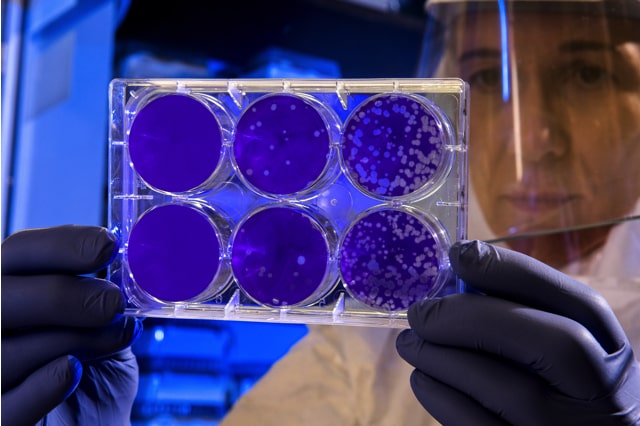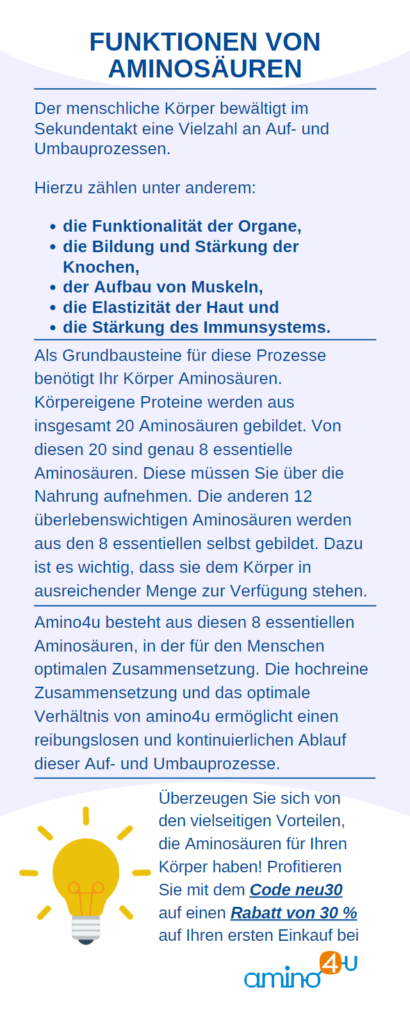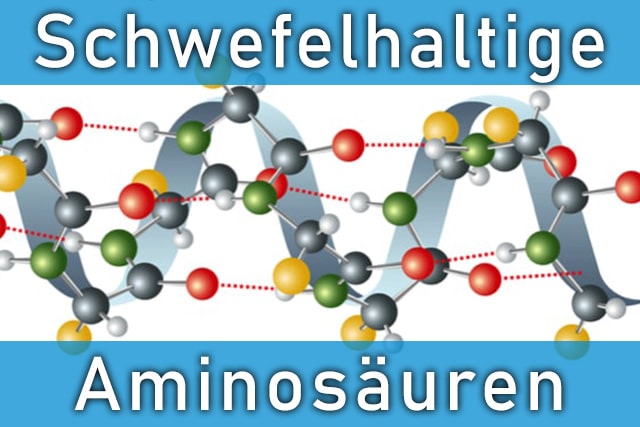When it comes to immune defense, most people first think of classic vitamins such as vitamin C and D. What is less known is that aminos - the smallest building blocks of protein - can also have a positive effect on the strength of our immune system. A good physical defense system is crucial, and not just in times of flu and coronavirus.
Find out here what protein building blocks can do for your health in this area.
The human immune system and how it works
The body's own immune response is very important for our health and well-being. Two crucial functions should be highlighted:
- The defense can eliminate and destroy foreign substances and microorganisms that have entered the body.
- It can also destroy the body's own cells that have become defective. This protects us from degenerated cells, which are characteristic of cancer.
The defense power of the human organism is shaped by various organs, molecules and cell types. They form a complex network in which each physical system involved works together with the other functions.
Problems and disorders in an immune reaction can arise not only because the functions are not sufficiently fulfilled. An overactive immune system can also lead to disorders and illnesses.
Allergies and the entire range of so-called autoimmune diseases, such as: B. Rheumatism, are due to hyperfunction. In this case, the immune reaction is directed against substances that are harmless or even against the body's own structures.
Well-functioning immune systems are in a balanced state.
If you want to support this balance, your goal may be to achieve balance between all functional areas. Not too much, not too little.
The development of physical defenses
A distinction is made between the following essential factors and components of the immune system:
- mechanical and biochemical barriers that prevent or prevent the penetration of foreign substances and pathogens. The most important external barrier is our skin.
- Granulocytes, killer cells and T-lymphocytes, which as cells have important tasks in the immune system. Some of these defense cells are organized in special organs such as the lymphatic system.
- certain amino acids proteins , which, among other things, take on the function of messenger substances in order to control the cooperation of the systems involved. They also serve to combat certain pathogens.
- a number of certain psychological immune factors.

The typical immune reaction
Although each immune response is somewhat specific, certain general processes can be identified for each immune response.
The first stage
If a pathogen penetrates the physical system because, like the current coronavirus, it was able to overcome the first mechanical barriers of the skin and mucous membranes, the system carries out an initial check .
This determines whether there has already been contact with this specific pathogen. If this is a first-time contact, certain cells such as macrophages begin their work.
These cells are part of a very primitive form of our innate immune response.
Cells such as macrophages absorb the pathogens into their interior - scientists say that they " eat " pathogens. That's why macrophages are called phagocytes.
The second stage
In a further step, the macrophages show fragments of the foreign pathogens on the cell surface to another part of the immune defense system. This is the signal for the cells B and T lymphocytes to become active now.
Depending on the pathogen, these cells can either kill the foreign bodies that have penetrated or they produce specific antibodies . Antibodies immobilize pathogens because they attach to them.
It is these antibodies that remain after the initial infection with a specific pathogen and thereby form the “ memory ” of the immune system.
When does a pathogen make me sick?
Whether a pathogen actually causes us to become ill depends largely on the state of our immune system. Typical cold symptoms of a flu-like infection, such as secretion of mucus from the upper respiratory tract, are our body's own response to the attack by pathogens.
The organism transports pathogens out of the body through mucus such as colds and sputum. Fever causes an immune response to be more intense due to an increased body temperature because the processes intensify overall.
Defenses form a very complex system . A variety of factors can have a negative impact on the interaction of the physical areas involved. An amino acid deficiency can be the cause.
Too strong an immune response is dangerous
An excessive reaction can also cause problems.
We can imagine such an excessive reaction as follows : Our immune system goes about its work incessantly and more and more intensively. After all, it is ultimately directed against your own body. Organ failure can result.
For example, we now know that the high death rate from the Spanish flu in 1918 was due to such an excessive immune response . That is why this disease has particularly affected and killed many young people with strong immune systems.
Factors that strengthen and weaken the immune system
A variety of factors influence the individual's immune response. It can be weakened by, among other things
- incorrect and inadequate nutrition
- Pleasure poisons in excess
- serious chronic illnesses such as cardiovascular disease and diabetes
- stress
- harmful environmental factors such as environmental toxins and radiation
- Old
- an inadequate supply of micronutrients and protein
Since factors such as stress and some chronic illnesses cannot be consistently controlled, the supply of micronutrients and aminos plays a special role in strengthening the immune response.

Amino acids immune system: How can they support?
Amino acids perform a variety of functions in the organism. Among other things , proteinogenic amino acids are the building materials of our body. The protein building blocks also function as messenger substances and as precursors of other building blocks.
Their role in immune defense was not recognized for a long time. Here, other substances such as vitamins initially attracted the attention of scientists and doctors.
Still, not all influences of amino acids on the immune system have been sufficiently researched.
What we do know is that amino acid deficiencies can weaken our physical defenses .
Some of the building blocks are particularly important for the defense systems in the human body.
From arginine to glutamine
Basically, it is particularly important that we supply our body with the essential protein building blocks. Essential amino acids cannot be produced by our organism itself and must be continually supplied with food.
The 8 essential building blocks are:
- isoleucine,
- leucine,
- lysine,
- methionine,
- phenylalanine,
- threonine,
- tryptophan and
- Valine.
These 8 aminos are particularly well absorbed by the body and have an effect in many places in the body, including the immune system.
In addition, they play a special role in immune defense .
1. Arginine
Most people are at least rudimentarily aware of the connection between a strong immune system and the health of the intestinal mucosa.
In fact, the intestine is one of the organs that is firmly integrated into our body's defense system . Here it is certain microorganisms that help determine our immune response.
The amino acid arginine can help keep the cells in the intestinal lining healthy. This amino acid also activates the thymus gland, which is also part of the body's defense system.
Finally, arginine plays an important role in the body's nitrogen cycle. Here it contributes to the formation of nitrogen monoxide. Nitric oxide is essential for the health of the cardiovascular system.
A healthy cardiovascular system is correlated with a strong immune system. Arginine is particularly linked to the amino acid lysine.
You should consume sufficient amounts of both amino acids.
2. Cysteine
This substance influences the maturation of lymphocytes .
Antioxidants fight free radicals. Free radicals are aggressive oxygen molecules that damage cells. They are therefore held responsible for a number of diseases and degenerative changes.
Scientists link free radicals to skin aging processes and chronic inflammation. An excess of free radicals weaken the immune response. Consuming anti-wrinkle amino acids could naturally slow down the aging process of the skin.
That's why it's important, especially during flu times, that there are enough antioxidants in our organism to protect our immune system.
3. Glutamine
Glutamine is needed for the formation of lymphocytes. We need lymphocytes to produce antibodies. Glutamine is naturally found primarily in our muscles . Intense physical exertion, which in individual cases can cause excessive demands and therefore stress, can lead to a weakening of our immune system.
The reason is that the muscle cells no longer contain enough glutamine and glucose. Glutamine also influences intestinal health .
4. Glycine
This amino acid also takes part in the formation of antibodies and antioxidants .
There are many other amino acids that affect the defense system, such as taurine, theanine, threonine and the substance carnitine, which is formed from aminos.
In this specialist article you will find further information on the topic: The immunological significance of amino acids

Amino acids Immune system: Provide proteins in flu times
Ensuring a good supply of aminos and important micronutrients such as vitamins during the flu season can strengthen your resistance.
They also support the body's own defense system if you are particularly sensitive to negative factors such as
- Stress,
- poor nutrition and
- Avoid excessive consumption of recreational toxins.
Everything that strengthens your healthy well-being also benefits your resilience. Pay particular attention to your daily intake of amino acids. It may also make sense to supplement with one or another special amino acid or as an amino acid complex .




